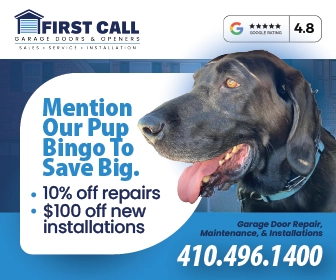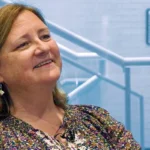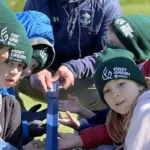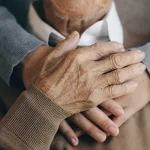Sam Greenholtz, Executive Director of the Literacy Council of Carroll County: With Roots That Run Deep and a Hand in Everything
by Kym Byrnes, photography by Nikola Tzenov
Sam Greenholtz is as Carroll County as they come. His family has been here for seven generations, and he has played dozens of roles in the community from sitting on boards and planning committees to serving in local government, to being a business owner, and several years ago he stepped into the role of executive director at the Literacy Council. He raised his two children here with his wife, Janice, and while he says they talk of moving south, he also says he can’t imagine leaving. For now, he plans to continue evolving the Literacy Council and supporting his other commitments, and if an opportunity presents itself to do good in other ways, he may just feel obligated to lend a hand.
What is your connection to Carroll County?
My roots run deep in Carroll County. I was born and raised here, I’m a seventh-generation Greenholtz in Carroll County. We settled in New Windsor as farmers in 1757 and migrated to Westminster over time. I graduated from Westminster High School then went to Catonsville Community College and finished my engineering degree in Illinois.
You’ve been active in almost every aspect of life in Carroll County — nonprofits, business, politics, government, youth athletics. What did you do professionally?
I was a fiber optic engineer. I spent 28 years with the companies that eventually became Verizon and then I started a consulting firm called Telecom Pragmatics. I had about 45 people working for me across the nation and we did consulting work all over the world.
What has kept you here in Carroll County?
The easy answer is family. But really, I like the people, I like the way things are here, it’s quiet here. In one way I hate to see Westminster grow because I don’t want it to lose its hometown feel, but at the same time, I realize we have to grow. I can remember when I was young and you’d walk down Main Street and you’d know everyone. I was born here, I grew up here. My wife and I have talked about moving south and we keep saying at some point we’ll do it and yet here we are still.
Your business had you traveling globally, but you stayed very involved in the Carroll community. What were some of the other roles you played over the years?
I probably couldn’t name them all off the top of my head. I think it started with becoming the chair of the Hashawha Board in early 1970, then I served on another committee to start planning for Carroll Community College. I served on the Board of Zoning Appeals, now I’m on the property tax assessment appeals board. For the city of Westminster I served as a town council member from 1986-1991, sat on the Westminster City Planning Commission, the Fiber Optics Study Committee and the board of the Carroll County Children’s Learning Center, was on Jaycees and a lot of other community organizations, and I’ve been the executive director of the Literacy Council since 2015.
After retiring you essentially started a whole new career — you are currently the executive director of the Literacy Council of Carroll County. What does the Literacy Council do?
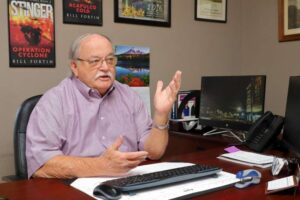 We’re definitely an evolving organization. The Literacy Council was originally started here because there was a shift as the county was changing from a farming community to more of an industrial area. At that time, most families were farmers, and to keep farm operations running kids dropped out of school to work. Back then it was all hands on deck and everyone in the family was involved. As industry moved in and farms started to disappear, we had a large population of people who were not necessarily illiterate, but they didn’t meet literacy standards. Up until the recent past, we were focused on finding people who had dropped out of school and needed more education. But more recently, we started to realize that there are folks who need literacy services in different ways. For example, we had more immigrants coming in who wanted to learn to read and write, so we started up a whole new ESL [English as a Second Language] program, and that took off. Then we expanded offerings to include citizenship programs. At the same time, we were also finding that there are folks who need some basic skills to help them find and get jobs, so we have had success building a workforce development program to fill that need.
We’re definitely an evolving organization. The Literacy Council was originally started here because there was a shift as the county was changing from a farming community to more of an industrial area. At that time, most families were farmers, and to keep farm operations running kids dropped out of school to work. Back then it was all hands on deck and everyone in the family was involved. As industry moved in and farms started to disappear, we had a large population of people who were not necessarily illiterate, but they didn’t meet literacy standards. Up until the recent past, we were focused on finding people who had dropped out of school and needed more education. But more recently, we started to realize that there are folks who need literacy services in different ways. For example, we had more immigrants coming in who wanted to learn to read and write, so we started up a whole new ESL [English as a Second Language] program, and that took off. Then we expanded offerings to include citizenship programs. At the same time, we were also finding that there are folks who need some basic skills to help them find and get jobs, so we have had success building a workforce development program to fill that need.
What’s ahead for the Literacy Council?
We want to continue improving people’s lives and I think we have to realize that there are a lot of different groups of people that need help. You can’t just say someone needs to learn to read, because there is so much that plays into successfully reading and comprehending what they’ve read. Some people have emotional issues, some have physical problems, some are mentally challenged; and then we have high school dropouts or those who sat in the back of class and stared out the window and have no comprehension skills and are now trying to get a job or to get promoted in a job and they don’t have [a diploma]. We’re working with all of this, not just people who can’t read. We need to continue to expand that — we’ve helped people get jobs, get CDL licenses to drive trucks, get into college — even had college students come to us who need help. We should rename ourselves. We’re no longer just a “literacy council,” we’re an educational facility that works with everyone. If you come in and say “I need to learn math because I’m going to be a cashier,” then we put you in our math course. We work with students based on their needs, and as we are helping them, sometimes other needs come up, so we try to provide other resources to help them find assistance. We don’t ignore those other issues because we know those problems are impacting their ability to learn.
Giving back to your community has clearly been important to you. What motivates you to get involved and give back?
I wasn’t poor growing up, but we weren’t rich either. I remember some really poor families from my younger years, and I just believe you need to help people, to make a better place for everybody. I give back because I love this county and I see a lot of things … and you almost want to take Bobby Kennedy’s “I see things and ask why” — I guess that’s what it is. I see things that I feel I can help with and want to try to do what I can, and if an opportunity presents itself, I will volunteer to do it.



